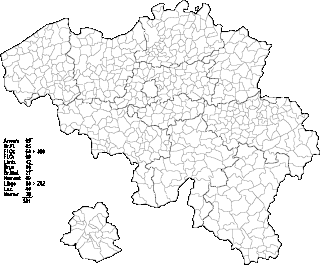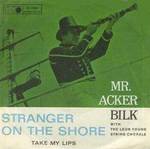Related Research Articles

Dame Shirley Veronica Bassey is a Welsh singer. Best known for her career longevity, powerful voice and recording the theme songs to three James Bond films, Bassey is widely regarded as one of the most popular vocalists in Britain.

Belgium comprises 581 municipalities, 300 of them grouped into five provinces in Flanders and 262 others in five provinces in Wallonia, while the remaining 19 are in the Brussels Capital Region, which is not divided in provinces. In most cases, the municipalities are the smallest administrative subdivisions of Belgium, but in municipalities with more than 100,000 inhabitants, on the initiative of the local council, sub-municipal administrative entities with elected councils may be created. As such, only Antwerp, having over 500,000 inhabitants, became subdivided into nine districts. The Belgian arrondissements, an administrative level between province and municipality, or the lowest judicial level, are in English sometimes called districts as well.

The Eurovision Song Contest 1961 was the 6th edition of the annual Eurovision Song Contest. Once again, the contest was held in the French seaside city of Cannes, having also hosted the 1959 edition. Organised by the European Broadcasting Union (EBU) and host broadcaster Radiodiffusion-Télévision Française (RTF), the contest was again held at the Palais des Festivals et des Congrès on Saturday 18 March 1961, becoming the first contest to take place on a Saturday evening, a tradition that has continued ever since. The show was again hosted by Jacqueline Joubert, who had also hosted in 1959.

The National Institute of Statistics and Economic Studies, abbreviated INSEE or Insee, is the national statistics bureau of France. It collects and publishes information about the French economy and people and carries out the periodic national census. Headquartered in Montrouge, a commune in the southern Parisian suburbs, it is the French branch of Eurostat. The INSEE was created in 1946 as a successor to the Vichy regime's National Statistics Service (SNS). It works in close cooperation with the Institut national d'études démographiques (INED).

"Stranger on the Shore" is a piece for clarinet written by Acker Bilk for his young daughter and originally named "Jenny" after her. The tune was written on a single scrap of paper by Bilk and handed over to Leon Young (1916-1991) who crafted the string arrangement, including the characteristic harmonic shifts at the very end.

Just Louis Fontaine is a French former professional footballer. A prolific forward, he is best known for scoring the most goals in a single edition of the FIFA World Cup, with thirteen in six matches in 1958. In 2004, Pelé named him one of the 125 Greatest Living Footballers at a FIFA Awards Ceremony.
The long and short scales are two of several naming systems for integer powers of ten which use some of the same terms for different magnitudes.

The 1961 French Grand Prix was a Formula One motor race held on 2 July 1961 at Reims. It was race 4 of 8 in both the 1961 World Championship of Drivers and the 1961 International Cup for Formula One Manufacturers.
"Blue Moon" is a popular song written by Richard Rodgers and Lorenz Hart in 1934 that has become a standard ballad. Early recordings included those by Connee Boswell and by Al Bowlly in 1935. The song was a hit twice in 1949, with successful recordings in the U.S. by Billy Eckstine and Mel Tormé.

"Itsy Bitsy Teenie Weenie Yellow Polka Dot Bikini" is a novelty song telling the story of a shy girl wearing a revealing polka dot bikini at the beach. It was written by Paul Vance and Lee Pockriss and first released in June 1960 by Brian Hyland, with an orchestra conducted by John Dixon. The Hyland version reached number one on the Billboard Hot 100, selling a million copies in the US, and was a worldwide hit. The song has been adapted into French as "Itsy bitsy petit bikini" and into German as "Itsy Bitsy Teenie Weenie Honolulu-Strand-Bikini", reaching number one on national charts in both languages. Several versions of the song have proved successful in various European countries. In 1990 a version by British pop band Bombalurina, titled "Itsy Bitsy Teeny Weeny Yellow Polka Dot Bikini", reached number one on the UK Singles Chart and in Ireland.

"Runaway" is a number-one Billboard Hot 100 song made famous by Del Shannon in 1961. It was written by Shannon and keyboardist Max Crook, and became a major international hit. It was No. 472 on the 2010 version of Rolling Stone's list of the 500 Greatest Songs of All Time and No. 466 on the 2004 version.

"Wooden Heart" is a pop song recorded by Elvis Presley. The composition is based on a German folk song "Muss i denn" and it was featured in the 1960 Elvis Presley film G.I. Blues. The song was a hit single for Presley in the UK Singles Chart, reaching No. 1 for six weeks in March and April 1961.

"Hit the Road Jack" is a song written by the rhythm and blues singer Percy Mayfield and recorded by Ray Charles. The song was a US number 1 hit in 1961, and won a Grammy award for Best Rhythm and Blues Recording, becoming one of Charles' signature songs.

The 1961 Tour de France was the 48th edition of the Tour de France, one of cycling's Grand Tours. It took place between 25 June and 16 July, with 21 stages covering a distance of 4,397 km (2,732 mi). Out of the 132 riders who started the tour, 72 managed to complete the tour's tough course. Throughout the 1961 Tour de France, two of the French national team's riders, André Darrigade and Jacques Anquetil held the yellow jersey for the entirety 21 stages. There was a great deal of excitement between the second and third places, concluding with Guido Carlesi stealing Charly Gaul's second-place position on the last day by two seconds.
"Why" is a hit song recorded by Frankie Avalon in 1959. It reached No. 1 on the U.S. Billboard Hot 100 chart published on the week of December 28, 1959. It was Avalon's second and final No. 1 hit.

"Break It to Me Gently" is a pop song written by blues musician Joe Seneca with lyrics by Diane Lampert. Both Brenda Lee and Juice Newton met with considerable success with their versions of the song.

"Da Doo Ron Ron" is a song written by Jeff Barry, Ellie Greenwich and Phil Spector. It first became a popular top five hit single for the American girl group The Crystals in 1963. American teen idol Shaun Cassidy covered the song in 1977 and his version hit number one on the Billboard Hot 100 chart. There have also been many other cover versions of this song, including one by the songwriters Jeff Barry and Ellie Greenwich themselves, performing as The Raindrops.

"Surrender" is a #1 song recorded by Elvis Presley and published by Elvis Presley Music in 1961. It is an adaptation by Doc Pomus and Mort Shuman of the music of a 1902 Neapolitan ballad by Giambattista and Ernesto de Curtis entitled "Torna a Surriento". It hit number one in the US and UK in 1961 and eventually became one of his best-selling singles. Presley held the record for most consecutive number one singles on the Billboard Hot 100 before 1966 when The Beatles beat the record with six consecutive number ones released between 1965-1966. That record eventually was broken in 1988 by Whitney Houston, who continues to hold the record with seven. It would hold the record for most consecutive number ones by a solo artist until Houston broke that record with "So Emotional". This was one of 25 songs Doc Pomus and Mort Shuman wrote for Presley. It has been recorded by many other artists, including Michael Bublé, The Residents, and Il Volo.

"I'm Yours" is 1961 song recorded by Elvis Presley which appeared on the Pot Luck with Elvis album. The recording was released as a single in 1965. It was written by Don Robertson and Hal Blair.
References
- ↑ Archives on "InfoDisc" site Archived 2010-01-07 at the Wayback Machine